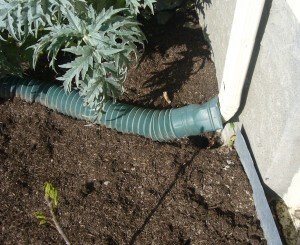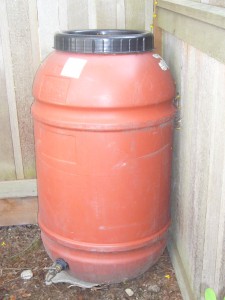Rain Gardens
Since we moved to our current home about 3 1/2 years ago I have been confronted by the issue of storm water drain-off on our property. Many of the houses in our neighborhood were built with gutter downspouts that tied in to pipes by the foundation that routed the water to the side sewers, then down into the main storm drains. The waste water and sewage is also routed into this same system. The pipes that routed the water away from our house failed before we ever moved in, so all of the storm runoff runs onto our lot which is supported by retaining walls on two sides. Left unchecked, the water would eventually create enough erosion and damage that we would lose one or more of the walls and possibly end up with a flooded basement. All of this is a long explanation about how I got interested in rain gardens.
A rain garden is a slight depression in the landscape that is filled with plantings that can withstand both flood and drought. The runoff from the roof (or anywhere else) is routed into the depressed area via underground pvc pipes or swales. Rain gardens provide a way to keep the storm water on your property and filter it down through the ground, rather than having it drain off into the main sewer system and into the water supply. When the system is overloaded anything that is in the sewer system (waste water, sewage, oil, bacteria, pesticides, lawn fertilizing chemicals) will end up in Lake Washington, nearby creeks and Puget Sound. By reducing the load on the combined system that handles all of our household waste water we can reduce flooding in the sewer system and protect both the water supply and people’s homes. You can have a combination of rain barrels, a cistern, and a rain garden if you want to harvest and use more of the rain water in areas other than the rain garden. In the PNW, you won’t want to rely on just your rain barrels or cistern. Even when it’s not winter we can get some massive amounts of rainfall in a short amount of time.
There has been so much work to do on our property that spending the time, effort and money on the rain garden has been something I was putting off, which may have been a good thing after all. I recently learned via the Lifestyle Landscapes Blog that the City of Seattle has been offering subsidies to homeowners in Ballard that who are willing to create their own “storm water treatment facilities” by detaching their downspouts and using the rain garden, cistern and/or rain barrels. There are some concerns around the project because the city is also offering a Storm Water Facility Credit to these homeowners. If a homeowner installs a rain garden, then sells the house and the new owners rip it out is there a mechanism for the city to discontinue the credit? What recourse is there if the city subsidizes the installation of the rain garden and then it is removed? All I can say is that I wish they would start some trials in my neighborhood!
For more information on managing storm water at home, check out the City of Seattle’s RainWise Program. If you want to disconnect your downspouts you need to have a sound plan in order to avoid damaging your property, or your neighbor’s.

